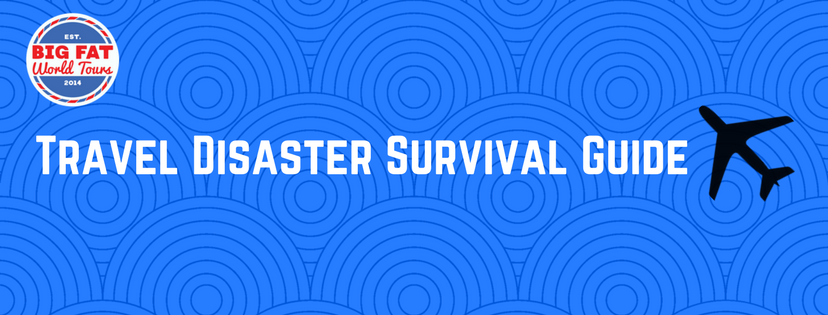There are a couple core truths in the life: death, taxes and travel disasters. I have been to nearly 50 countries and have dealt with them all. Here are the biggest disasters I have had to face and a travel disaster survival guide to help your next disaster go more smoothly.
Lost/Stolen Passport
This use to be one of the worst things that could happen to a traveler but in today’s digital world, it’s a minor inconvenience. First, make sure you have a digital photo or photo copy of your current passport and driver’s license. Second, you’ll need to visit the nearest US consulate or embassy. Agencies can issue full ten year passports or, if you’re in a rush, a temporary passport which will get you back to the states. You are looking at the loss of time to get a new one issued and $150 or so for the replacement.
Stolen Wallet/Bank Card Doesn’t Work
From pick-pockets to having your primary bank card simply not work in X country, the fear of having no cash overseas is one of the biggest travel disasters a traveler can face. Fortunately, there are a couple ways to combat this disaster. First, always, I mean always, have a back up credit card and/or bank card hidden away from your main wallet. Personally, I went to Croatia to find out after I got there my internet bank would not allow me to use the ATM’s there for security reasons. Luckily, I had a 2nd bank card from another bank. Second, it never hurts to stash a $100 bill away as well in your luggage or under the sole of your shoe. Third, Western Union operates all over the world and if you are stranded w/o any money, any friend or relative can easily wire you money.
TIP: Open up a travel only bank account. Great way to protect yourself in case of theft and an easy way to save for a trip.
Missed/Canceled Flights
I can’t think of a worst disaster than this one. Missing a flight starts a domino effect throughout the rest of your trip. Here are a couple tips to prevent this and/or react if it happens. First, arrive at the airport early and take missing your flight out of the equation. Second, go online before your trip and look up other flights going to your destination on the same day. Have these flight numbers handy in case you need them. Third, travel insurance and/or your travel credit card are your best friends in cases like this. While they have stringent rules on what is covered, you are usually covered if you miss your flight for illness, natural disasters or car accident. Fourth, once you have missed your flight, head straight for the airline counter and try and work out another flight. Depending on the circumstances of the missed flight, you may be on the hook for buying another ticket or simply have to park yourself in the airport until the next flight leaves. Always be nice to airport personnel, it’s not their fault you missed the flight. They will sometimes help you out of a bind if you are genuinely nice to them.
TIP: If you are like me and often book 2 separate flights somewhere in an effort to save money, then you need to be more strategic. Your ‘connecting’/separate flight is under no obligation to rebook you if your 1st separately ticketed flight is late. There are services like Kiwi.com that will cover you if you book 2 separate tickets somewhere and miss your connecting flight.
Getting Sick or Hurt
You only have 2 choices here: preventative and reactive. To prevent getting plane sick, I would start taking Airborne (or it’s generic friend) the day I intend to travel. They come in gummy, chewy and tablet form. I take 2-4 of these the 1st 24 hours of travel and they generally protect me from illness. If I find I am getting sick while overseas, I usually start taking Airborne again and zinc tablets. Zinc has been found a great mineral for illness, just Google this for more information. If this combo doesn’t do the trick and I am in an unfamiliar country, I will go to my hotel and ask them to help me get what I need at a pharmacy.
Getting a cold is one thing but falling or seriously injuring yourself is another. Anyone going overseas for an adventure holiday that involves running, cycling, hiking, mountain climbing, etc are going to need to have medical insurance. If you are going to a rural place, a plan with helicopter evacuation is critical. I recently fell during a trail run and fractured my ribs. Luckily, this happened in the USA but 2 weeks before that I had been in Nepal doing a similar run and if I had fallen there, getting medical attention would have been extremely difficult.
TIP: I use World Nomads when I need to medical insurance.
Lost Luggage
It’s a huge drag to lose your luggage when traveling. Of course, there is one surefire way to prevent this, only bring carry-on luggage. But if you can’t always do this when you travel, there are cases when your bags will go missing. Here is how to deal. First, always bring a change of clothes in your carry-on. Ideally, you want a fresh shirt, undies and toiletries. Second, do not lose your baggage claim ticket. I usually stick mine to the back of my passport. Third, if your bag is 100% lost, you will need to file a claim. Airlines typically do not pay out more than $3,500 per passenger on U.S. domestic flights and maybe slightly more in international. So, do not pack your family heirlooms in your checked bags. Airlines are sticklers for receipts showing the contents of your bags, so don’t say a brand new Macbook was in your bag if it wasn’t.
Tip: Sometimes your credit card can also reimburse you for a lost bag. They will usually do that if you purchased the flight using their card.




Leave a Reply